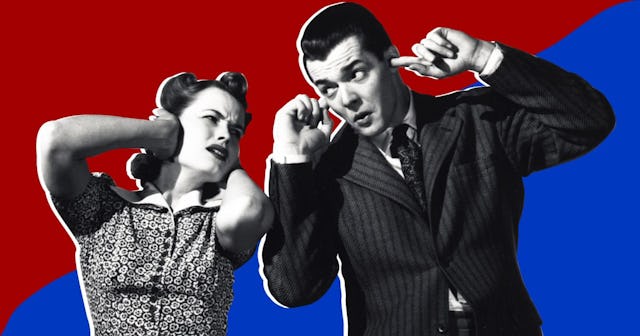My Husband And I Disagree On Hot Button Issues

I’d imagine money, the division of household/family labor, and politics are the top three sources of strife in relationships these days. In a perfect world, we’d partner with folks who shared our love language and worshiped our opinions for the brain gold that they are. Like most folks, I was more concerned with marrying for love than shared politics.
But even if I had put in the effort to find someone who was better aligned with my political beliefs, folks change throughout their lives. In other words, as people evolve, so do their social and political opinions.
I’m liberal AF. Nine times out of ten, I will speak out in support of the little guy and the downtrodden. I’m ridiculously preoccupied with the way that history, inequality, and social scripts impact the way we assign value to certain folks in our society. And I’m almost always ready to discuss those views in person, and at the very least on Twitter.
I pride myself on the effort I’ve given to be globally aware and learn a little about a wide range of identity groups. Social science is my thing and my eye for disparities has perfect vision. I’m a #Blacklivesmatter type of girl and anyone who knows me expects me to give history lessons about the impact of white supremacy on the United States.
However, my husband’s eye for these things is a bit more blurry. Don’t get me wrong. He’s woke enough to know the bootstrap myth is BS and often sends me videos of AOC tearing folks a new one during congressional hearings.
We both shook our head at that video of Joe Biden saying “poor kids are just as bright as white kids.” As a matter of fact, he’s the one who sent it to me. But he’s in the Air Force and, though not conservative, he’s a lot more centrist than I am. He’s the type who will spend his time trying to reason with a bigot, likely because he’s typically surrounded by them. In my case, it’s just easier to cut them all off. He gives folks more chances than I do. You’re more likely to get a “benefit of the doubt” pass from him than me. And he’s very rarely frustrated enough to rock the boat.
These differences have had an impact on how we interact in our relationship. It impacts our parenting too. For instance, initially, I wanted the children to have super Black names with direct African significance. He was more concerned with something earthy.
It makes us less likely to hang out with each other’s friends because his are either military folks or gamers and mine are all damn near socialist and queer AF.
Of course, it also drips into our politics. But not always in the ways one might think. Last election, I voted for Hillary and my husband voted for Bernie Sanders. At first, I was annoyed. I bit the bullet and voted for Hillary Clinton, despite her horrifying track record of adding to the stigma and mass incarceration of Black youth, because I bought into rhetoric about preserving unity in the party.
Naturally, I was happy that my husband wasn’t one of those people who voted for Trump. But I was shocked that he voted for Bernie Sanders as the nominee. It suggested that he was a little more radical than I previously believed but also willing to go against the grain to prove a point.
At the time, it felt like he risked everything to prove a point — something he’s regularly done. The man I married is severely stubborn. But this seemed like it was more about authenticity than anything else. I’d always seen myself — and not him — as the one who acts out of heart more than mind and that incident challenged that perspective.
It’s been almost four years, and again, we’re backing different candidates. But last week, we talked about who we’re voting for and why for the first time and I had the chance to understand his perspective. It didn’t change what I plan to do. Yet it was comforting to hear more from him on why he wasn’t looking for the same things in a candidate that I was.
Again, in the often discussed yet completely unattainable perfect world of relationship harmony, we’d check the same name on the ballot. Nonetheless, our different, as opposed to shared, politics adds to the diversity of our relationship, and I’m learning to see that as a strength instead of a weakness.
Of course, it’s worth being explicit about what differences diversify and what differences destroy. It’s okay to see different leaders as capable of leading us all to freedom. It’s not okay for that difference to be based in the denial of others ‘rights to live fully and holistically based on their identities.
It’s easy to see the differences as a cause of strain on your relationship. And I promise you sticking your head in the sand and ignoring the differences without communicating isn’t going to make you feel better.
The areas that we disagree on remind me that there are several ways to achieve the same mission. Our children will be better for it. We’re learning to have tough discussions without seeing them as a cause for separation. Election season is really giving us the chance to put those skills to the test.
Let’s see if we pass this time.